In the new film HERD from Dark Sky Films, director Steven Pierce pulls off the remarkable feat of making a zombie film feel fresh. Even more notable is the fact that it’s not even the zombies that make it feel that way. Rather, HERD’s fairly typical, gross, meandering walkers take a back seat to an emotionally rich story about the complexities of relationships and community.
Our entry into the world of HERD comes through Jamie (Ellen Adair) and Alex (Mitzi Akaha), a married couple struggling to regain their footing after losing their first child. In an effort to reconnect, the women leave the city behind for a five-day canoe trip into the wilderness. However, things quickly begin to spiral when Alex breaks her leg. To make matters even worse, while seeking help, the pair are informed by some gun-wielding locals (portrayed by Jeremy Holm, Jeremy Lawson, and Brandon James Ellis) that a full zombie outbreak has occurred. Disconnected from the larger outside world, Jamie and Alex soon discover that fear, misinformation, anger, and ego can be almost as dangerous as zombies themselves.
To help solidify HERD’s distinctive approach, Pierce and team brought composer Alexander Arntzen into the fold. No stranger to genre work, Arntzen’s credits include LAST MAN DOWN, FOLLOW HER, and INITIATION, along with a wealth of incredible short films. For HERD, Arntzen embraced the film’s rural Missouri setting through expansive, atmospheric veils of sound that seem to settle across the landscape. He also utilizes a variety of percussion elements that inject a cold, industrial tension with a determined, rhythmic resolve. And then there’s the beautiful cello moments that reinforce the humanity and heart at the film’s core.
Ultimately, it is Arntzen’s music that serves as the final finishing veneer that unites and strengthens everything Pierce and crew set out to achieve with HERD. Even though the film itself was an admittedly low-budget production, Arntzen adds a level of polish that easily entices and ushers viewers into the film’s all-too-believable world. To find out a bit more about what went into the creation of HERD’s sonic soundscape, we decided to go right to the source for a lovely chat with the composer himself.

DG: Before we dive into HERD, tell us a little bit about your background and why you wanted to pursue film composing.
Alexander Arntzen: I had different stages of discovering I wanted to be a film composer. I think as early as first grade, I started piano lessons. Quite frankly, I actually didn’t like practicing piano at all and doing the scales and stuff. Even to this day, I honestly have a hard time doing that consistently.
But starting in sixth grade, for my final elementary school recital, I got to write an original piece of music. That kind of changed my mind. It wasn’t that I didn’t like music or didn’t like movies, but in terms of my relationship with music, it hadn’t really solidified in a positive way yet. Then, slowly, in middle school, I would dabble on GarageBand, putting together loop-based things and weird kind of funny tracks. I then graduated to eventually actually sort of half-composing, half-loops, slowly building to taking composition lessons in high school.
It also hit me at some point, I know it’s a bit cliche, but watching STAR WARS that I love movies. I almost love movies as much as music. I realized those really big musical moments were some of the things that I gravitated to the most. What I appreciated is how it manipulates the audience in a way, hopefully in a positive way. Sometimes, I guess it’s in a negative way, like tricking you out. Sometimes there’s games that the composer can play cerebrally. That part of it seemed very fascinating to me.
I also thought that if I weren’t going to be a film composer, I would have been like a therapist potentially or something in that field. So, I already was very much engaged with how the mind works in general. I think I got to live out both jobs doing this because I also have to be in the minds of the actors and the filmmakers, bridging all these different mental and psychological divides. It’s kind of a win-win for me that I kind of get to do both.
Probably, by early high school, is when I discovered that I did want to be a film composer. My parents were very supportive, especially once my dad was told that it’s actually a very bonafide career. It still has its pitfalls, but unlike maybe just being a singer-songwriter and gigging at a bar hoping you make it, it’s a little more structured. There’s a little more of a traditional craftsman career out of being a film composer and I think he was comforted in that. But they believed in me regardless and supported me.
I also didn’t want to be stuck in college forever. You don’t even need a bachelor’s degree to do what I do, technically. I think at the time, maybe there are other places that offer it now, but Berklee at the time was the only place that had a bachelor’s degree in Boston for film scoring. So I did that, came back here and have just been working professionally. By the end of this year, I’ll have been working professionally out of college for 10 years.
It’s interesting how you mentioned your other path may have been in the mental health arena, considering the emotional attunement you must have to be a composer. Do you ever find exploring emotions and translating them to music emotionally exhausting or difficult to navigate?
It can be. Also, there’s two different things that are happening psychologically. There’s me dealing with the film and what the film needs, and then it’s also [the filmmaker]. Sometimes when the filmmaker comes in, frankly, they’re exhausted. They’ve been through a battle to fund the film, shoot the film, edit the film, which, especially on an indie level, can take longer. So they’ve been through their own version of a battle.
So, part of my thing is to also be a cheerleader for the filmmaker. Not even the film, but telling the filmmaker, “You do have something great. I see something great in it. I think I can bring something even better to it.” So there’s that part of it where you’re being a therapist to them a little bit, if they need that, for emotional support.
And then, yes. There’s me trying to square the circle potentially, depending on if there’s multiple voices in the room. If it’s just me and the filmmaker, that’s usually best. Sometimes, there can be too many chefs in the kitchen, and then it’s making sure you’re keeping everybody happy while also still being authentic. I still believe from a philosophical standpoint that my boss is actually the film, not the filmmaker. So I’m only ever hoping that the filmmaker sees the film the way I see it because if not, that’s where a clash can potentially begin.
Ultimately, I’m going to do what the filmmaker wants. The film, the cinematography, the performances, the actors all leave clues as to what the film needs and wants. And hopefully, the filmmaker’s needs and wants are the same needs and wants. Or maybe they can bring out some other thing that I’m not aware of. That’s then where the music can if for some reason something was lacking in a scene, cerebrally or subliminally add that flair. Maybe there wasn’t enough tension in the lines, and I can add more tension that it didn’t have otherwise.
Sometimes it affects me, but most of the time…I’ve heard this phrase, and now that I have been a composer as long as I have, I can say with some certitude that sometimes the saddest music a composer writes, they’re so happy that day. They’re watching the most heartbreaking scene in the world, but they’re having a great day. And then there’s days where I’m heartbroken. I’m the one who’s having a horrible day, but I have to write happy music. That’s just part of the job. It’s this weird thing where you’re not an actor, but you kind of have to be an actor on some level.
About five years ago, I read a book called THE WAR OF ART by Steven Pressfield and it kind of changed my philosophy. This is my job. I treat myself as a blue-collar worker. I don’t treat myself as a highfalutin, “I’ll write music when it feels right.” I write music because this is what I do. People are paying me to write X amount of minutes and get the job done in X amount of time.
So I need to deliver music every day. Whether they’re the best minutes of music I’ve ever written or the worst minutes of music I’ve ever written, you have to put something on the wall because you can’t edit nothing. You have to get the job done. Then, hopefully, that’s where the filmmaker, if they are a good collaborator with you, they’ll help you. If you have a hard time, they can steer you back in the right direction.
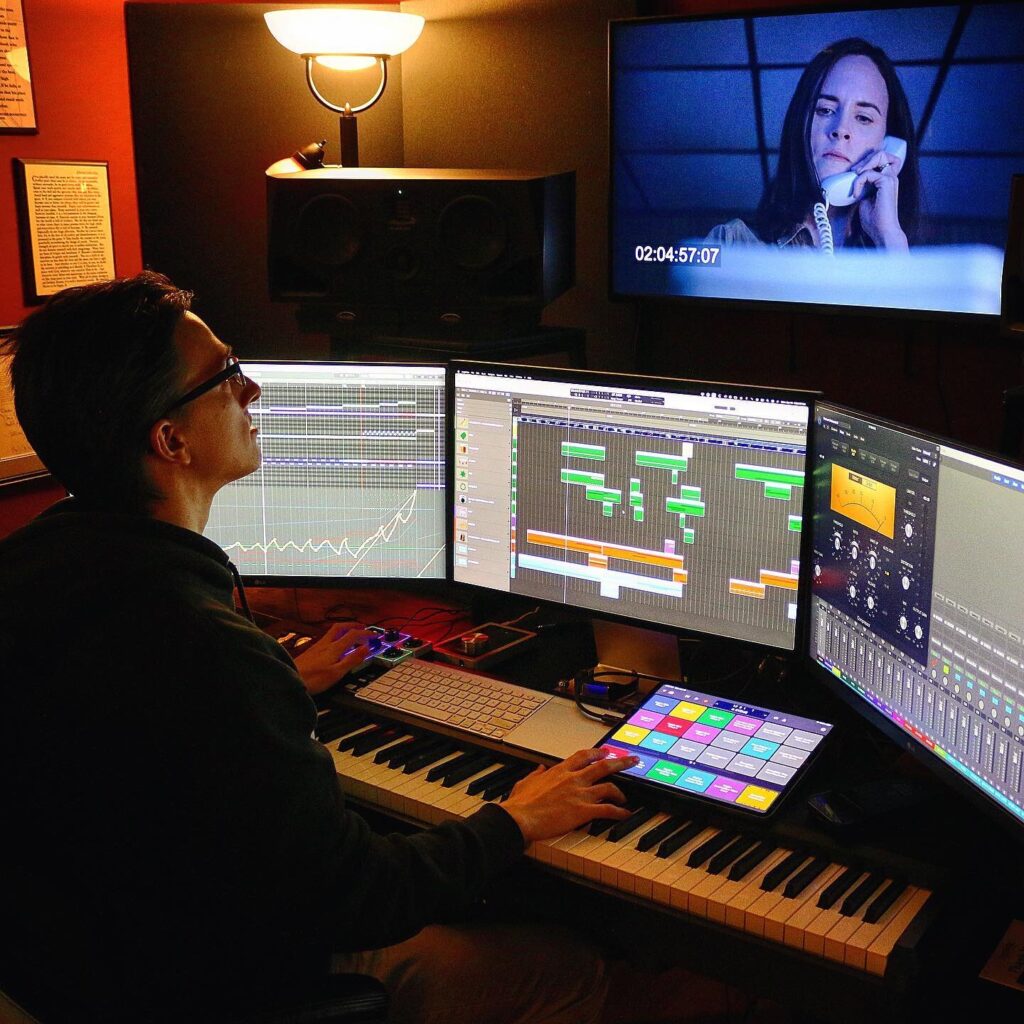
Other than the obvious paycheck, what are some of the green flags that draw you to pitch for or sign onto a project?
So, I’d actually gone to high school with the composer George S. Clinton’s (MORTAL KOMBAT) daughter, and then he became the chair of the department at Berklee, so I knew him very well. One of the things that has always stuck with me and that I always carry with me when I’m deciding to take on a project is, he said there’s three P’s — project, person, and pay.
Obviously, starting out, pay is a bit motivator sometimes because you don’t always have the luxury of working with an A-list filmmaker on an A-list project, but maybe the pay is good. Also obviously, if you have none of them, probably don’t take the gig. Early on, usually what you’re doing is kind of robbing Paul to pay Peter in the sense that you’re going to take on certain projects for the money, like a corporate or commercial gig. You’re just making money to make money. Then you’re taking on the passion projects that might not pay a lot, but you really like the filmmaker. Sometimes they’re a great person, but they don’t necessarily make great films. Or they do make great films, but they’re not a very nice person or they’re very micromanaging.
Unfortunately, you have to weigh all that out. I’m a bit of a masochist. So for me, it’s all about the end goal which is, I want to work on the best, most awesome projects. I guess for me, number one is the project itself. I have discovered that I’m definitely a genre-heavy composer. I love genres, like fantasy, sci-fi especially, but also horror, thriller, crime, etc. I just think that, partly from a selfish point of view, genre films are going to lend themselves to music that’s going to be more interesting.
Those are the various echelons of things I think about. It’s very much this aggregate process. Sometimes it’s not all working on this project, but I have enough projects that are doing enough of the other things, the other P’s and the other facets that I’m looking for, that I’ll take on this one project for this particular opportunity that it might give me.

So, in relation to HERD, how did you get involved with this project, and where did you come during the production timeline?
I emailed them much earlier than when I ended up actually really working with them. I had seen the log line on IMDB Pro. I have this email program called Spark that allows me to keep up with filmmakers when they’re not ready to work with me. So basically, I’ll snooze the email, and then it’ll pop up whenever they want me to check in with them: three months, two months, one week. So, very politely and very persistently, I would just once a quarter check in with the line producer Matt Mundy.
Sometimes, the director is not as easy to get a hold of for one reason or another. I did this with a couple of other features as well, but I just politely checked in. They say not yet, not yet, and then all of a sudden, what always ends up happening is all of a sudden it goes from not yet, not yet, and then, in the summer of 2022, then it was like, “We shot it. We’re ready. We have a scene. Do you wanna demo?”
I did the demo, they loved it, and now I’m scoring it. Now they’re trying to submit it to SXSW and Sundance and all that kind of stuff for the fall festival season. So I’m like, basically at the end of summer, scoring HERD full-time for about six weeks. That was at least the initial drawing in process; just quietly staying with them and checking in with them.
Before I discovered this email program, which allows me to stay in touch with people very politely, it was either you forgot to follow up, or you’d be really annoying, and you’d bug them like every week because if not, you’d feel like you’d forget. But now, I get to be this omnipresent force. Like, there’s people that have told me, “Don’t talk to me until next year.” So, guess who’s going to talk to them a year from now?
Obviously, things can happen, and then they don’t need me, but that’s just part of the persistence. That’s just part of the drive. Because you can be good at the job, but weirdly, there’s the job before the job, which is getting the gig. It takes a certain level of persistence while being polite and being political about not pushing too much because, as I said, they’re in the middle of their own war, trying to make this film, so the last thing they need is more pressure, more creative decisions they have to make that they aren’t ready for.
It feels like a very delicate interpersonal dance.
Now, some filmmakers, like, in that instance, I essentially was not brought in until the film was locked. It was ready to go, and I just flew in, and I scored it. Long-term filmmakers that I have a previous relationship with over a decade. I sometimes get to talk to them well before that with the script.
But also, some filmmakers I’ve never worked with want to lock in a composer before they start shooting for some reason. Everybody’s different. Some people don’t even want to think about it until it’s shot and edited. Some people want to know already, like, “I have got this guy. This is going to be the composer for our film.”
Very rarely am I talking to them while they’re shooting, though. Once they’re shooting, it’s kind of like, that’s the cone of silence. It totally goes dead, dead, dead, dead, for a little while. So, usually, you hit them pre-pro or right at the beginning of post. Or just before it hits production is usually the best time to try to reach out to them. Also, you can reach out too early, and they’re in development. It’s like, “This isn’t even funded. I don’t know what to tell you right now. I have no idea if we can even afford music on this project. We might use library music for all I know.” [Laughs]
It must be so cool when that all finally works out, like with HERD.
It’s always amazing when it does. Because it is an impossible task of just staying consistent and wondering, but you also go off of their cues. Like if they don’t seem to be that interested, I might not even follow up because I don’t necessarily want to be looked at as someone who’s just bugging them. But certainly, if they say the phrase “Let’s stay in touch” or “We’ll talk soon,” then I feel like that’s more than an invitation of consent to continue politely catching up with them at a certain point in time.
Once you were officially hired on for HERD, what were some of the initial ideas and inspirations for the sound palette and musical direction?
It was a mixture of things. Obviously, they temp the film with temp music, which sometimes is on the money. Sometimes it’s a little off the money. So there’s always a conversation initially where I’ll ask (in this case, Steve, the director), “What do you like about the temp? What do you not like about the temp?” I want to know what they like because I want to lean into that.
And hopefully, we’re slowly building two different roads. We have this old temp road, and we have our new actual original film score, where we’re taking all the stuff we like. But then, hopefully, we’re adding all this new stuff that either he thinks of, or I think of, or we all think of together creatively.
He knew he wanted it to be this, and I agreed with it, this rustic country sort of rural feel to the score. Kind of raw-sounding. The only difference that I sort of then brought to it was I wanted to make a different sound for the most obvious villain.
You could argue that in this movie, there could be more than one villain. But the darkest shade of villain is this one guy named Sterling (Timothy V. Murphy), who’s part of this weird state military or some sort of militia group. I wanted his sound to be more metallic, more industrial, more cold, as opposed to the more rustic, raw country vibe.
If you had no sound on, but the music was playing, you could, in a more old-school, traditional sense, tell the villains are on the screen because of that music being there. It becomes more rigid. There’s this kick that is always playing when he’s on screen. There’s these more metallic instruments, but then you still have the play of the country stuff and some of the more emotional stuff.
So, I think, initially, it was set by me doing the demo. It is actually kind of nice to do a demo because you set a tone, and if they like that, even if they change some of it, at least I already have had an opportunity to build a palette that they liked enough to hire me. I feel like at least I’m comfortable that this is a good starting place with certain noises.
A lot of it is, unlike maybe, a more traditional film score that’s a little more pretty sounding. Most of it, other than a solo cello, is mostly from sample libraries. And so, I wanted to make sure I was picking samples from my sample libraries that sounded kind of ugly and not super pretty. Like the more aleatoric kind of atonal libraries that I have and leaned into that stuff to make things as unpretty as possible. I’m a little bit out of tune and warbly in some cases rather than just a normal track of music that’s more pretty. That was a big thing for me.
This film is not only emotionally tense but physically tense as well. I know you’ve done a lot of other action-oriented projects, so I’d love to hear if there’s any differentiation in approach and how you keep that tension consistent.
A lot of this movie definitely has a slow burn to it. So I think part of it is pacing, which was definitely highly scrutinized by me and by Steve, but also how to keep the tension in a certain way. There’s this one big key monologue with the main character, Jamie, when she’s opening up to her father, in a way of speaking.
We were very careful with the music there. That’s not a moment of pace. That’s definitely a slow thing, and we need the music to have an attention about it, but a slow, emotive piece of music there. Whereas, there’s a build-up near the end with the two warring militia factions where it starts slow, but then it slowly builds up, and the rhythms build up.
Rhythm is a big differentiator when we’re dealing with more psychological and emotional tension. That stuff probably doesn’t have as much pace to it. It’s probably slower undulations and more just uncomfortable noises. Whereas then you take that, but then you amp it up. Then you have that shot of adrenaline of percussion and more brassy and more piercing elements that relate to the zombies and relate to some of the more evil characters that are on screen with the gunfire raining down and everything. So, I think that’s a big part of it.
When you’re doing a more traditional action movie, I think it’s all a little more clear. Everything is happening, but with this one, strangely, this movie is, although it is a horror movie and it’s an action movie, it’s really a drama that just happens to have zombies and people with guns.
That’s why I wanted the score to still have this emotional core that was the most pronounced, hopefully, by the end and in the middle.
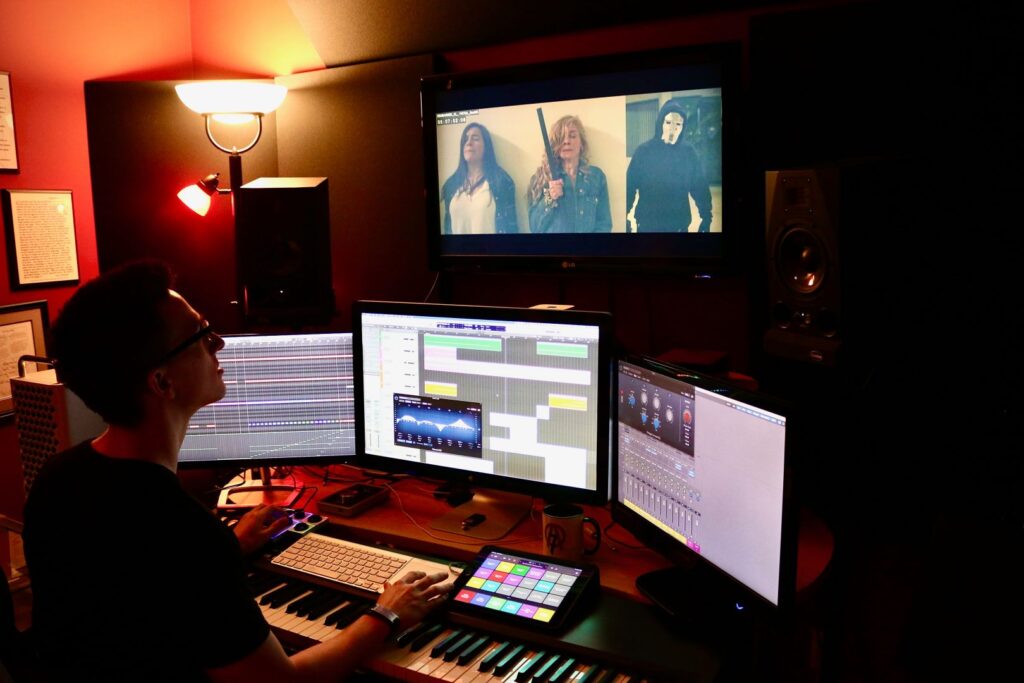
I really did enjoy how percussive and atmospheric this score is. Were there any other interesting or unique instrumentation choices or techniques that you implemented to help create that vibe?
I don’t think there’s necessarily any found sounds. I mean, there’s instruments that sound sort of industrial, but there were sample libraries that happened to be just the clanking of metal. The only other really big unique thing was the live cello player we had, Gretchen Blum. She’s a really great cello player. She soloed over this one sequence, which I really wanted to have happen, when they were at the end of a zombie fight, they’re in a truck bed, and there’s just this long shot of them driving on a road. She did open fifths, and I just let her loose. Like, I had the chord structure, but I just wanted it to be rustic, sad, and evocative.
And it’s tricky because you don’t want it to be too virtuosic and too busy. So it was this very hard, fine line of not too boring, but also not like too, Vivaldi or something. Or going too, percussive. It still needed to be emotional. Then she also did a lot of ostinatos, which dirtied up the sound in some ways because it’s very hard to play some of those ostinatos that fast.
There’s even a couple of other places I had to do these weird tremolo sort of sounds. Just very eerie, kind of copying what some of the samples I already had were doing. But the fact that she was actually there, I could explain to her the exact timing of why it was sounding this way. It allowed for more control and dynamic of starting without it and then building in a very specific way. Because, although I’m good at sequencing with MIDI, usually, at least just from my perspective, the node that I work from is number zero to 127. All composers know this, but that’s the range. That’s as good as a sample library is, like, that’s the dynamic range. Whereas a player can go from zero to, in my opinion, a million.
There’s just so many more dynamic ranges and points of contrast and difference that you can talk them through and, strangely enough, even like…I wouldn’t think this would be obvious, but I know that when you’re conducting an orchestra, it makes sense. But, I found that when I would actually, like, by hand conduct her in this room, she seemed to even have a better performance. Just because, I guess, she sensed my energy and what the intention was behind it.
I always forget that. I know what’s in my head. And that’s also the trick a filmmaker has to do. They have to accomplish the same goal I do with musicians, which is that we know what we want, they don’t know what we want. And we sometimes think that we know that they know what we want, and they don’t know what we want.
I guess you could maybe over-communicate, but I always side with the caution of over-communicating. I would much rather say too much than hope that they “get it.” Like, it’s not a secret. We’re working together. It should be collaborative. There should be no secret.
It should just be like, “This is what I’m trying to do.” And then you can say, “I don’t know how to do that.” Then it’s, “Okay. Let’s talk about how do we then bridge that divide and get there.” That was probably the most fun thing. We spent a three-hour session just recording over five or six cues, doing the improv, doing the written stuff, and then doing some extra weird, evocative, scary sounds that just kind of punched up some places that otherwise would have been okay, but I think that she really transcended the score.
That is such a good reminder that, although there is so much technology at your fingertips these days, there’s just something about a live performer that you can’t undervalue.
Especially these days with the whole scary stuff of AI. Actually, for me, it only makes me feel stronger that the human touch is still the only thing that is unique. Everything else will be, by its definition, artificial. It’s not real. It’s not human. And if we’re telling human stories, we need to have humans helping to tell those stories at all points along the line. Controversial take from a composer, I know. [Laughs] That will be the disclaimer across the title, “Composer thinks humans should make art!” [Laughs]
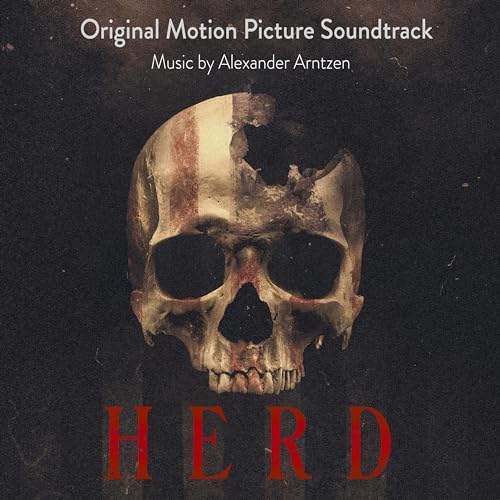
HERD is now available to rent or purchase on VOD. Additionally, Arntzen’s score for the film is available on all major streaming platforms.
Tags: Alexander Arntzen, Dark Sky Films, Interviews, Rachel Reeves

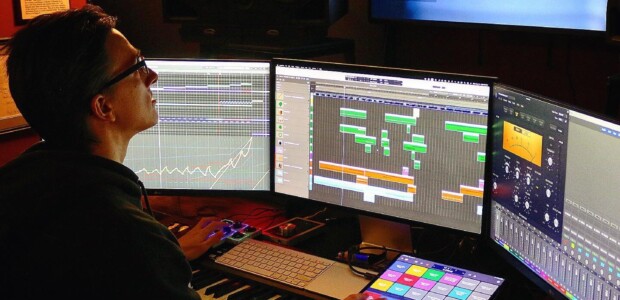
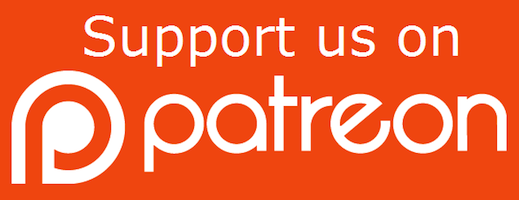
No Comments